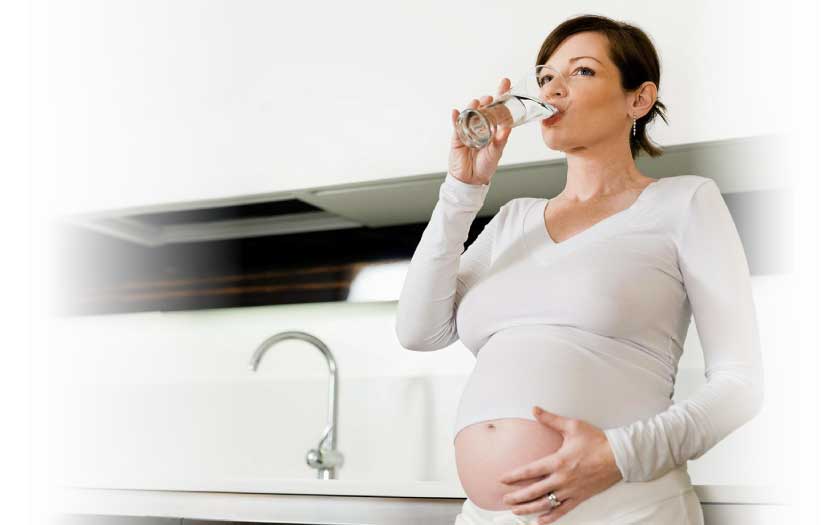Did you know that it would never do to go thirsty for too long when you’re pregnant? Did you know too that in pregnancy, dehydration can be a serious health risk to both mom and her baby? Read on.
You’ve heard it many times before: You need to drink eight to ten glasses of water every day. The quantity can include other (non-alcoholic) drinks taken in, but, ideally, plain water should make up most of your liquid intake. Other drinks such as juice, milk, tea, and coffee do contain water and contribute to your fluid intake, but they also contain extra calories.
Your pregnant body will be undergoing a lot of internal changes and needs a lot of water for performing some of these additional functions. If you do not take insufficient water, it may not be able to adjust to changes properly. This can affect the growing fetus too. Water helps in the formation of the placenta, through which the fetus takes nutrients. In the later stage of pregnancy, water helps in forming the amniotic sac. In every sense of the word, sufficient water is needed for a pregnant body to function well.
The main cause of prenatal dehydration: Morning sickness
This is one of the initial causes. About 50% to 80% of pregnant women experience morning sickness, were throwing up and the inability to hold down food and drinks occur. Prolonged morning sickness leads to the loss of fluids and electrolytes from the pregnant mom’s body, causing dehydration. Moreover, nausea will not allow for fluid intake making it harder for the body to regain the lost water. If not addressed quickly, it may have grave consequences for the health of both mom and her baby.
Morning sickness appears during four to six weeks and peaks around 10 to 16 weeks. The symptoms include nausea, vomiting, frequent urination, and in some severe cases, cold sweat. These symptoms will disappear by the time a pregnancy reaches the second trimester, but in some cases, women continue to have morning sickness beyond that.
Hyperemesis Gravidarum
Severe morning sickness, also known as Hyperemesis Gravidarum, is a rare condition that affects around 2% of pregnant women. The symptoms, the same as those of morning sickness, remain throughout pregnancy, and may lead to fever, associated with nausea and vomiting, causing excessive sweating and dehydration.
Other possible causes
Other than morning sickness, dehydration during pregnancy may also occur due to the following:
Diarrhea: Hormonal changes, dietary preferences, and certain food intolerance can lead to diarrhea. This can occur at any time throughout the pregnancy. It may also result in excessive loss of fluids and electrolytes. Replenishing the body during and after a bout of diarrhea is crucial during pregnancy.
Lack of fluids: It would be a good idea to check with your doctor if you suspect that you’re not taking in enough fluids. On the other hand, be wary of taking in too much, for that too may have consequences in the form of maternity complications. Climate and weather have to be taken into consideration too — You will be more susceptible to dehydration during drier, hotter weathers, where you might also lose moisture through sweat.
Travelling by plane: Air in the cabin contains little moisture, and it can cause dehydration in your body. You should try to stay hydrated by drinking water when traveling. Airline rules may not allow carrying water bottles, but you can always ask for a drink of water in-flight whenever you need it.
Age: The older you are the more difficult it gets to conserve water during pregnancy. You might also feel less thirsty, and this may unwittingly lead to dehydration.
Overheating: Heat exhaustion could overheat your body draining away all the fluids. Be wary of your body’s need for water while exercising, for instance, for it’s one of the ways a pregnant body becomes overheated quickly.
Fever: Running a fever during pregnancy could cause vomiting, loss of fluids, and poses a high risk of dehydration.
Low Amniotic Fluid
The amniotic fluid serves as an unborn baby’s support system. It provides protection and cushioning for the baby and assists with the development of many of his or her systems. Low amniotic fluid in the early stages of pregnancy can lead to birth defects or even a miscarriage, where else in the later stages of pregnancy it can cause preterm birth or impaired growth. Low amniotic fluid may also result in labor complications such as a required cesarean delivery or compression of the umbilical cord. There are a few potential causes for developing low amniotic fluid, maternal dehydration could be one of them.
Avoid dehydration at all costs!
Drinking enough fluids, especially clean, clear water, is crucial in avoiding dehydration during pregnancy, In addition to this habit, there are other ways you can try to keep dehydration at bay. They include limiting drinks with lots of sugar or caffeine because they can actually serve as diuretics.
Remember too that exercising or overexerting in hot or humid environments such as in our country can greatly increase the body’s risk of overheating, which can quickly lead to dehydration. In short, throughout your pregnancy, be sure to stay hydrated and have water or other fluids easily accessible at all times.
Image source: sleepingshouldbeeasy.com


